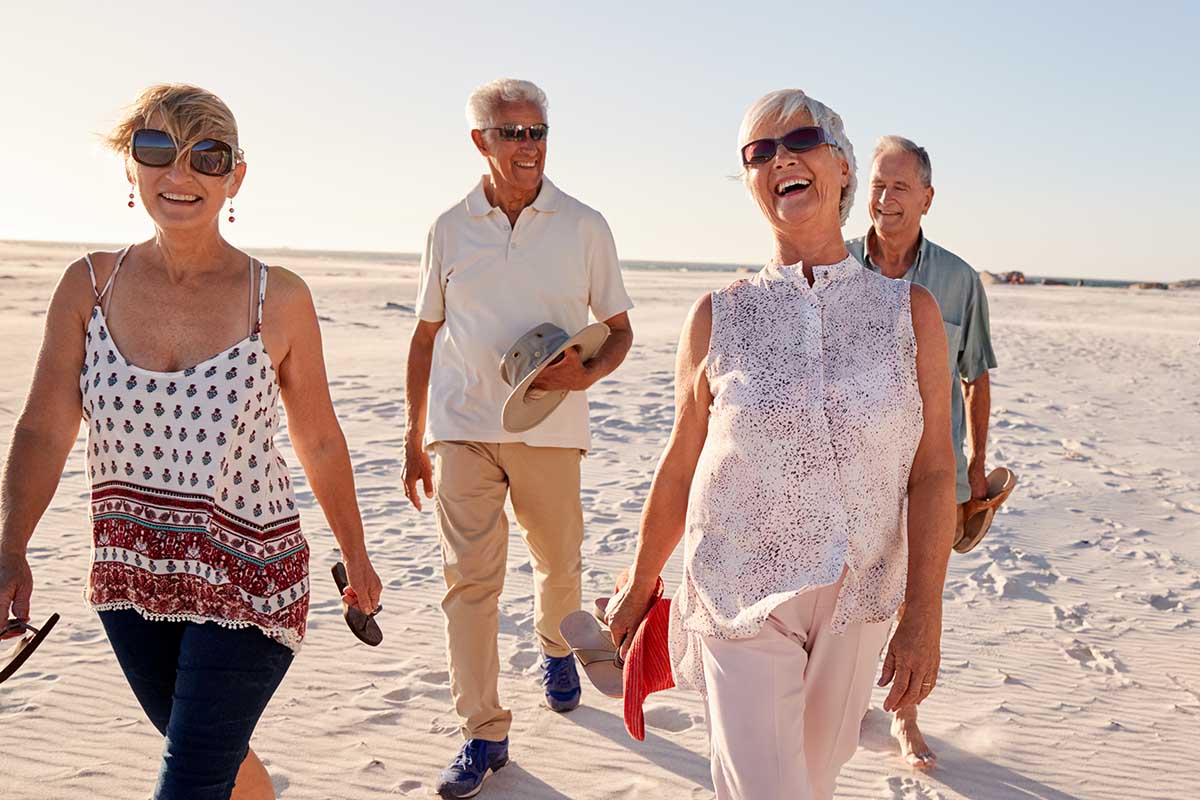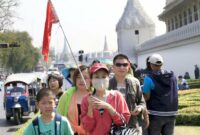Senior citizen trips ideas offer exciting possibilities for exploration and relaxation. This guide delves into diverse travel options, from domestic adventures within the United States to international escapades, catering to various budgets and activity preferences. We’ll explore accessible destinations, practical budgeting strategies, and crucial health and safety considerations to ensure a smooth and memorable journey for senior travelers. Whether you’re dreaming of a relaxing beach vacation, a culturally enriching city tour, or an adventurous exploration of nature, we provide the resources and insights to help you plan your perfect getaway.
We cover a wide range of topics, including selecting suitable destinations based on accessibility and climate, comparing escorted tours versus independent travel, managing potential health concerns during travel, and creating a realistic budget. The aim is to empower senior citizens to confidently plan and enjoy fulfilling travel experiences.
Types of Trips & Activities
Choosing the right travel experience is crucial for ensuring a memorable and enjoyable trip for senior citizens. The ideal trip should balance relaxation, stimulation, and accessibility, catering to varying levels of mobility and interests. Careful consideration of trip type and planned activities is essential for a successful and fulfilling journey.
Trip Types Suitable for Seniors
Several travel options cater specifically to the needs and preferences of senior travelers. These options prioritize comfort, accessibility, and ease of travel, minimizing stress and maximizing enjoyment.
- Cruises: Cruises offer a convenient and relaxing way to see multiple destinations without the hassle of packing and unpacking. Many cruise lines offer amenities specifically designed for seniors, such as accessible cabins and onboard medical facilities.
- Train Journeys: Scenic train journeys provide a comfortable and relaxing travel experience, allowing seniors to enjoy breathtaking views and a slower pace of travel. Many routes offer accessible carriages and onboard amenities.
- All-Inclusive Resorts: All-inclusive resorts offer a stress-free vacation experience, with accommodation, meals, and activities included in the price. Many resorts offer accessible facilities and amenities tailored to seniors’ needs.
- Guided Tours: Guided tours, especially those focusing on specific interests like history or nature, offer a structured and informative travel experience with minimal planning required. Many tour operators cater to senior travelers with accessible transportation and pacing.
- River Cruises: Similar to ocean cruises but often with a more relaxed pace and smaller scale, river cruises offer opportunities for scenic views and gentle excursions.
Relaxing Activities for Senior Travelers
Relaxation and rejuvenation are key components of a successful senior travel experience. These activities promote well-being and allow for a slower pace, encouraging enjoyment and minimizing stress.
- Spa Treatments: Massages, facials, and other spa treatments offer a luxurious and relaxing experience, promoting physical and mental well-being. Many spas offer treatments specifically designed for seniors.
- Nature Walks: Gentle nature walks in scenic locations provide opportunities for fresh air, exercise, and connection with nature. Choosing trails with minimal elevation changes and well-maintained paths ensures accessibility for seniors with varying mobility levels.
- Historical Site Visits: Visiting historical sites and museums offers opportunities for learning and cultural enrichment. Choosing sites with accessible entrances and facilities ensures that seniors can fully participate and enjoy the experience.
Engaging and Stimulating Activities for Seniors
Maintaining mental and physical engagement is important for seniors, and travel provides excellent opportunities for this. These activities cater to diverse interests and mobility levels.
- Gentle Yoga or Tai Chi: These low-impact exercises improve flexibility, balance, and overall well-being. Many resorts and hotels offer classes specifically designed for seniors.
- Cooking Classes: Learning new culinary skills is a fun and engaging activity that stimulates the mind and provides a sense of accomplishment. Many destinations offer cooking classes tailored to different skill levels.
- Wine Tasting or Brewery Tours: These activities offer opportunities for sensory stimulation and social interaction, providing a fun and engaging experience. Many wineries and breweries offer accessible facilities and tours.
- Local Market Visits: Exploring local markets provides opportunities for cultural immersion, sensory stimulation, and interaction with locals. Many markets offer accessible entrances and pathways.
- Guided Sightseeing Tours (with adjustable pace): Tours with options for shorter walks and breaks accommodate varying mobility levels, ensuring everyone can participate comfortably.
Sample Multi-Generational Family Trip Itinerary
This itinerary balances activities appealing to all ages while prioritizing the comfort and needs of senior family members.
Destination: A coastal town with accessible beaches and historical sites (e.g., Carmel-by-the-Sea, California).
| Day | Morning | Afternoon | Evening |
|---|---|---|---|
| 1 | Arrival and check-in to an accessible hotel with ocean views. Relax and unpack. | Gentle stroll along the beach, enjoying the ocean breeze. Optional: build sandcastles. | Family dinner at a restaurant with ocean views. |
| 2 | Visit a local historical museum with accessible facilities. | Relaxing spa treatments for some family members. Others can explore local shops. | Casual dinner at the hotel or a family-friendly restaurant. |
| 3 | Guided walking tour of the town (at a relaxed pace with frequent breaks). | Free time for individual activities: shopping, reading, relaxing by the pool. | Farewell dinner at a fine-dining restaurant. |
| 4 | Departure. |
Budgeting and Planning for Senior Trips
Planning a senior citizen trip requires careful budgeting and meticulous planning to ensure a smooth and enjoyable experience. This involves considering various expenses, securing necessary travel insurance, and implementing cost-saving strategies. Thorough preparation will minimize stress and maximize the enjoyment of your well-deserved vacation.
The Importance of Travel Insurance for Senior Citizens
Travel insurance is crucial for senior citizens embarking on trips, offering protection against unforeseen circumstances. Policies often include coverage for medical emergencies, trip cancellations, lost luggage, and other potential issues. The cost of medical care abroad can be significantly higher than at home, making comprehensive medical coverage particularly vital. Different coverage options exist, ranging from basic plans covering only essential aspects to comprehensive plans encompassing a wider array of potential problems. For example, a basic plan might cover trip cancellations due to illness, while a comprehensive plan could also include emergency medical evacuation and repatriation. It’s advisable to compare several policies and choose one that best suits your specific needs and destination. Consider factors such as pre-existing medical conditions and the length of your trip when selecting a plan.
Tips for Saving Money on Senior Travel
Several strategies can help seniors save money on their travels. Focusing on accommodation, transportation, and activities can significantly reduce overall expenses.
- Consider alternative accommodations: Instead of luxury hotels, explore budget-friendly options such as guesthouses, Airbnb rentals, or hostels (if comfortable with a shared environment). These alternatives often offer significant cost savings without compromising comfort or safety.
- Utilize cost-effective transportation: Explore options like public transportation, ride-sharing services, or even renting a car with friends to share costs. Booking flights and other transportation in advance can also secure better deals. For example, booking flights two to three months in advance can often result in lower fares compared to last-minute bookings.
- Choose free or low-cost activities: Prioritize free activities like visiting parks, museums on free admission days, or exploring local markets. Many cities offer free walking tours, providing a cost-effective way to discover the destination’s history and culture. Consider purchasing a city pass if it offers significant savings on multiple attractions.
Sample Budget for a Seven-Day Trip to Portugal
This example outlines a potential budget for a seven-day trip to Portugal for two people, illustrating how various expenses can be accounted for. These figures are estimates and can vary depending on travel style and preferences.
| Expense Category | Estimated Cost (USD) |
|---|---|
| Flights (round-trip for two) | $1400 |
| Accommodation (7 nights, mid-range hotel) | $700 |
| Food and Drink (7 days) | $700 |
| Activities and Entrance Fees | $350 |
| Transportation (local) | $150 |
| Travel Insurance (for two) | $100 |
| Miscellaneous Expenses | $100 |
| Total Estimated Cost | $3500 |
Using Budgeting Apps or Spreadsheets to Plan and Track Travel Expenses
Budgeting apps and spreadsheets provide excellent tools for planning and tracking travel expenses. These tools allow for detailed expense categorization, enabling better monitoring of spending against the allocated budget. Many free apps are available, offering features like expense tracking, budgeting tools, and currency conversion. Spreadsheets allow for greater customization and offer the ability to create detailed charts and graphs to visualize spending patterns. For example, a spreadsheet could be set up with columns for date, expense category (e.g., flights, accommodation, food), amount spent, and remaining budget. Regularly updating these tools ensures that you remain aware of your spending and can make adjustments as needed.
Health and Safety Considerations
Planning a senior citizen trip requires careful consideration of health and safety to ensure a smooth and enjoyable experience. Prioritizing well-being before, during, and after the trip is crucial for a successful adventure. This section outlines essential steps to minimize risks and maximize the enjoyment of travel for older adults.
Pre-Trip Health Consultations
A pre-trip visit to a physician is paramount for senior travelers. This consultation should cover any existing health conditions and the potential impact of travel. The doctor can assess the suitability of the trip based on the individual’s health status, recommend necessary vaccinations depending on the destination, and review current medications. They can also provide advice on managing chronic conditions during travel and suggest strategies for mitigating potential health risks associated with air travel, changes in climate, or physical activity levels during the trip. For example, individuals with heart conditions might need to discuss medication adjustments for air travel or increased physical activity, while those with diabetes should plan for managing blood sugar levels effectively throughout the trip.
Essential Health and Safety Items to Pack
Packing appropriately for health and safety is crucial. A well-stocked travel health kit should include: a comprehensive first-aid kit containing bandages, antiseptic wipes, pain relievers, anti-diarrheal medication, motion sickness remedies, any prescription medications with a copy of the prescription, a thermometer, any personal medical devices (e.g., inhaler, blood pressure monitor) with extra batteries, a list of allergies and medical conditions, emergency contact information, and copies of insurance cards. Additionally, comfortable and supportive footwear, a walking stick or other mobility aids if needed, and sunscreen are essential for safe and comfortable travel.
Managing Medical Emergencies While Traveling
Having a plan for medical emergencies is essential. Before departure, research the nearest hospitals and medical facilities at your destination. Inform your family or a trusted friend about your itinerary and check-in regularly. Consider purchasing travel insurance that covers medical emergencies and evacuation. In the event of a medical emergency, call local emergency services immediately. If possible, have someone accompany you to the hospital or medical facility. If you are alone, ensure you have clearly written documentation detailing your medical history, allergies, and contact information.
Managing Common Health Concerns During Travel
Senior travelers may have various health concerns, including mobility issues and chronic illnesses. For mobility issues, choosing accommodations and transportation that cater to these needs is vital. This might involve selecting hotels with elevators and accessible rooms or using transportation services with wheelchair access. For chronic illnesses, such as diabetes or heart conditions, careful planning and adherence to medical advice are crucial. This includes carrying necessary medications, monitoring vital signs regularly, and adjusting activity levels as needed. For example, individuals with arthritis might need to schedule regular rest periods and choose activities that are not overly strenuous. Proactive planning and attention to detail are key to managing these health concerns successfully.
Final Review
Planning a trip as a senior citizen requires careful consideration, but the rewards of exploring new places and creating lasting memories are immeasurable. By thoughtfully planning your itinerary, considering your health needs, and budgeting effectively, you can embark on a safe and enriching adventure. This guide serves as a starting point; remember to personalize your trip to reflect your unique interests and capabilities. Embrace the journey, and create unforgettable memories that will last a lifetime.




